What is ‘contact centre workforce management’ (WFM)? You’ve probably heard the term many times. But what does it actually mean? How does it fit into the contact centre landscape? What are its component parts? And why does it matter?
In this post, Chris Dealy at injixo goes back to basics to reveal the core elements that make WFM tick and the pivotal role it plays in driving contact centre success.
The central goal of workforce management (WFM) is to optimize the deployment of the most valuable – and costly – resource in every contact centre: the employees.
To quote Brad Cleveland:
“WFM is about having the right number of people in the right places at the right times, doing the right things”
That’s complicated, because in every contact centre, three opposing forces are in play:
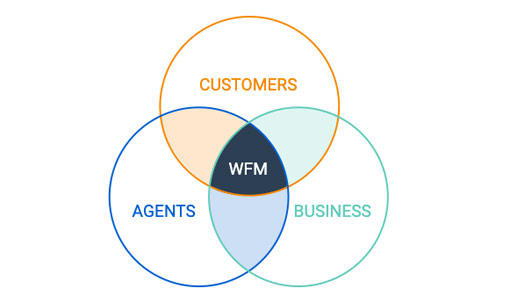
- Exclusively focusing on customers by always having plenty of agents to handle the contact volume is great for your company’s reputation and may result in revenue growth, but could render your business unprofitable.
- Putting your agents first may make your company a great place to work, but if the customer experience is terrible and staffing costs are excessive, your contact centre may be a place where nobody works in the long run.
- A well-run business is always looking for ways to optimize costs, but reducing staffing levels without regard to customer experience or agent burnout is equally unsustainable.
Contact centre WFM matters because it enables contact centres to optimize the balance between the three forces, simultaneously improving outcomes for the customer, the employees (or agents), and the business.
Sounds too good to be true? Read on…
What is the Workforce Management Cycle?
WFM consists of five interconnected steps. WFM is a repeating process and that’s why it is often characterized as a cycle:
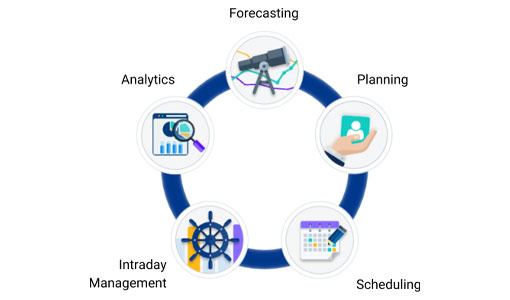
Forecasting
It starts with forecasting, which predicts future contact metrics such as volume and average handling time (AHT).
It uses historical data and business intelligence that you add, such as upcoming marketing campaigns.
Then you need to convert the forecast of volume and AHT into a forecast of required staffing, taking into account the grade of service that you want to achieve.
Planning
Planning is about making sure that your contact centre employs the right number of agents to cope with the anticipated scale of the business in the long term.
It can be tempting to skip straight from forecasting to scheduling, but if you don’t invest enough effort in planning, your hiring and training program will be based on guesswork.
And that means you simply won’t have recruited and trained all the people you need when it comes to the scheduling stage.
Scheduling
Scheduling is about creating shifts for employees that match supply and demand for staff as closely as possible, as often as possible.
It sounds straightforward, right?
Yet, anyone who has wrestled with spreadsheets and sticky notes knows it’s anything but simple. You’ve got to create shifts that cover demand efficiently, down to 15 or 30 minute inervals.
And you must take into account agents’ skills, labor laws, employment contracts, opening hours, and other constraints.
Intraday Management
Intraday management is about identifying where reality has deviated from plan. If it can go wrong, it will go wrong.
For example, you could be hit by an unexpected volume spike, unusually high sickness levels or simply find that your agents are not logged in when you need them to be. It enables you to take swift and effective corrective action to defend your KPIs.
Analytics
Analytics give you insights that will help you to constantly improve. For example, you can measure your shrinkage, which will feed into your staffing calculations next time around the cycle.
Reports on schedule adherence and conformance, together with absence reports, are vital tools for 1:1 meetings with agents.
Employee Engagement
Employee engagement underlies all the stops in the cycle. It is all about the level of motivation, satisfaction, and involvement that call center agents have in their work.
It is a critical factor in achieving high-quality customer service and operational success. WFM is vital to this since it lets your agents interact with the planning process and feel more in control. It puts your employees front and centre.
The magic of workforce management lies in how these elements interconnect. When you can accurately forecast demand, successfully schedule the right personnel, manage performance effectively, and take your agents on the journey, you’re well on your way to driving efficiency and success in your contact centre.
What is the Impact of Contact Centre Workforce Management?
Here is what “the right number of people in the right places at the right times, doing the right things” looks like in pictures:
Without WFM
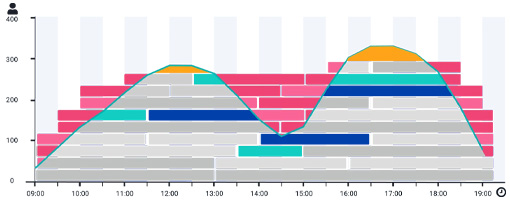
With WFM
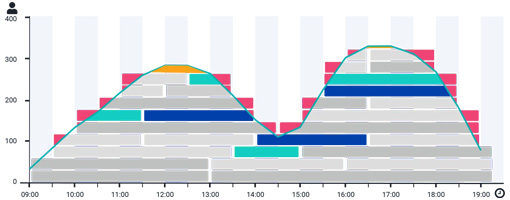
In both charts, the green line shows the demand-driven requirement for a single activity for a single day.
That’s the number of agents required in each time interval to handle the volume of contacts (e.g. calls, chat messages, emails, etc.) in that interval. The horizontal bars show the shifts assigned to staff across the day.
In the first chart, it’s clear that we rarely have the right number of agents in the right places at the right times.
There are periods in the morning and afternoon, highlighted in orange, when insufficient agents are scheduled.
At those times, the customer experience suffers, the service level goal isn’t met and the employees get stressed
. At other times, highlighted in red, there are too many agents on duty. This is a waste of the contact center’s budget.
The second chart shows what WFM does: supply and demand are much more closely aligned.
Result:
- Satisfied customers
- Happier employees
- Optimized business bottom line
This blog post has been re-published by kind permission of Peopleware – View the Original Article
For more information about Peopleware - visit the Peopleware Website
Call Centre Helper is not responsible for the content of these guest blog posts. The opinions expressed in this article are those of the author, and do not necessarily reflect those of Call Centre Helper.
Author: Peopleware
Published On: 8th Dec 2023 - Last modified: 9th Jan 2025
Read more about - Guest Blogs, Chris Dealy, Peopleware




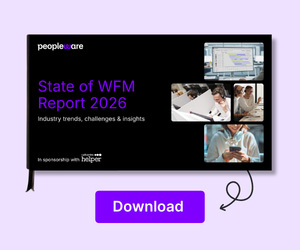

 Peopleware is a leading workforce management (WFM) solution, trusted by over 500,000 users in 30+ countries. With smart forecasting, automated scheduling and real-time management, organizations can optimize workforce efficiency and keep work aligned with demand. From precise time tracking to flexible planning, Peopleware helps organizations boost operational efficiency and foster a more engaged, productive workforce.
Peopleware is a leading workforce management (WFM) solution, trusted by over 500,000 users in 30+ countries. With smart forecasting, automated scheduling and real-time management, organizations can optimize workforce efficiency and keep work aligned with demand. From precise time tracking to flexible planning, Peopleware helps organizations boost operational efficiency and foster a more engaged, productive workforce. 









